Religious Life
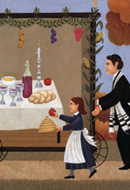 Be Joyful
Be JoyfulTuesday, September 21, 2010 by Yehudah Mirsky | Jewish Ideas Daily » Daily Features
Alongside the more colorful and distinctive rituals of the Sukkot festival—the taking-up of lulav and etrog, the sukkah itself—there is another command, less concrete and more penetrating: "And you will rejoice." Indeed, the passage in Deuteronomy (16: 14-15) concludes, v'hayita akh sameah, translatable as "you will be altogether joyful," or even "you will be only joyful."
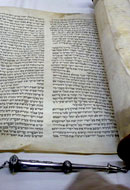 Orthodoxy and Innovation
Orthodoxy and InnovationMonday, September 13, 2010 by Aryeh Tepper | Jewish Ideas Daily » Daily Features
For many religiously observant Jews, the traditional siddur, or prayer book, constitutes a problem. One such Jew was the great hasidic rebbe, Nahman of Bratzlav (1772-1810), who articulated the problem in terms appropriate to his time: the fixed prayers, with their praises and petitions, are like a well-traveled highway, and well-traveled highways attract robbers. By which he meant that excessive routine makes it difficult to concentrate the mind.
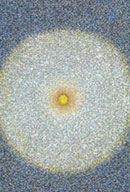 Creations
CreationsTuesday, September 7, 2010 by Yehudah Mirsky | Jewish Ideas Daily » Daily Features
Rosh Hashanah, the beginning of the year, marks the creation of the world. Or does it? The Torah refers to Rosh Hashanah, although not by that name, as the first day of "the seventh month" (Leviticus 23:24)—the seventh, that is, if you're counting from Nisan, the month of Passover. That month is designated as the beginning of the year in the first act of the Exodus: "This month will mark for you the first of the months; it will be, for you, the first month of the year" (Exodus 12:2). Like revolutionaries everywhere, the Israelites wanted a new calendar.
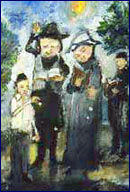 Repentance = Freedom?
Repentance = Freedom?Thursday, September 2, 2010 by Yehudah Mirsky | Jewish Ideas Daily » Daily Features
In the thick of the month of Ellul, nearing Rosh Hashanah, penitence is or should be in the air. Also recently marked was the 75th yahrzeit of the great mystic, jurist, and theologian Abraham Isaac Kook (1865-1935). As it turns out, Kook's teachings on the meaning of repentance are among his most striking, stamped with his distinctive mix of piety and audacity. In his eyes, teshuvah, generally translated as "repentance" but literally and more powerfully "return," signifies not only a deepened and renewed commitment to religion and commandments but, paradoxically, nothing less than a new birth of freedom.
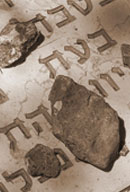 Cemetery Politics
Cemetery PoliticsWednesday, September 1, 2010 by Allan Nadler | Jewish Ideas Daily » Daily Features
Among the many bones its various enemies pick with the Jewish state, one has been much in the news lately: bones, very dry bones, residing in cemeteries both real and imagined all across the country.
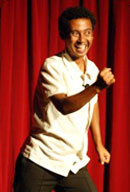 It Sounds Better in Amharic
It Sounds Better in AmharicThursday, August 26, 2010 by Aryeh Tepper | Jewish Ideas Daily » Daily Features
In his one-man play, It Sounds Better in Amharic, the Ethiopian-born Israeli actor Yossi Vassa humorously contrasts life in the old world and the new, mulling over the differences between traditional and modern ways of dating and the respective virtues of traveling by donkey or Lamborghini. He also narrates his family's 400-mile journey from Ethiopia to Sudan—from where, in 1984, the Israeli air force flew 8,000 Ethiopian Jews to Israel. Vassa's family covered the 400 miles on foot, in three months. "Not to brag," he comments, "but it took the children of Israel 40 years."
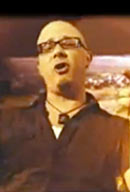 Psalms for the Perplexed
Psalms for the PerplexedWednesday, August 18, 2010 by Yehudah Mirsky | Jewish Ideas Daily » Daily Features
Some mainstream Israeli musicians have recently been turning for material to religious texts; others have become immersed in the musical traditions of Sephardi Jewry. The two trends have come together in a new album, Mizmorei Nevukhim ("Psalms for the Perplexed"), by Kobi Oz.
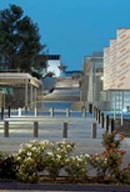 The New Israel Museum
The New Israel MuseumFriday, August 13, 2010 by Aryeh Tepper | Jewish Ideas Daily » Daily Features
An expanded and revamped Israel Museum re-opened to the public in late July after three years of renovations. While the modest architecture remains as it was, the modernist cubes rolling with the Jerusalem landscape, the jumble of buildings has been streamlined: 25,000 square feet of exhibition space have been added, but the number of items on display has been reduced by a third. Overall, the design is significantly more user-friendly, with a spacious new entrance hall leading to the museum's remarkable collections, including its three most significant wings: archeology, Jewish art and life, and fine art.
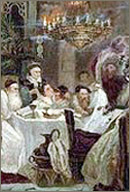 Out of the Well of the Past
Out of the Well of the PastMonday, August 2, 2010 by Yehudah Mirsky | Jewish Ideas Daily » Daily Features
Jewish history was once regularly portrayed as a march from pre-modern stasis to modern revolution and change. This picture held its attractions, offering clearly marked battle lines for later proponents on either side of the ongoing ideological struggles between traditionalists and modernizers. By now, however, we have been well instructed in the deceptive simplicity of all such efforts to impress order on the relentless flux of history, which so often dissolves the closer we look at it.
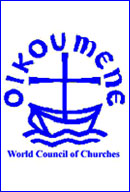 Mainline Protestants and Israel
Mainline Protestants and IsraelThursday, July 29, 2010 by Elliot Jager | Jewish Ideas Daily » Daily Features
So enamored are today's mainline Protestant churches with the Palestinian Arab "narrative" that they seem to have altogether forgotten, or denied, their own prior history of support for Israel and Zionism. Indeed, some of them appear to be trying to derail the Zionist enterprise altogether.
Editors' Picks
Be Joyful Yehudah Mirsky, Jewish Ideas Daily. "And you will rejoice," the Bible commands with regard to Sukkot. But can even God summon up joy on demand? (2010)
Myrtle, Date Palm, Willow, Citron Arthur Schaffer, Tradition. What do the "four species" of Sukkot signify? A botanist finds an agricultural interpretation that would have been readily available to an ancient Israelite farmer. (PDF, 1982)
Declaring Death Gil Student, Torah Musings. In the 1960's, Israeli doctors began aggressively promoting the view that declaration of death was a purely medical matter. But it wasn't easy to enlist rabbis in their cause.
Bad Bans Brad Hirschfield, Washington Post. By banning bans on circumcision, California now drives the debate about this issue underground, where it will fester among the most hostile opponents of the practice.
The Fast of Fasts Philologos, Forward. In rabbinic times, when a Jew spoke of "the fast," there was no need to be more specific—as even a passage in the New Testament interestingly attests.
Brave New World Mary J. Loftus, Huffington Post. A law professor and Orthodox rabbi contends that new reproductive technologies should be embraced—cautiously, and within limits—for the good they can do.
Obama's Advice for Your Rabbi Tevi Troy, Wall Street Journal. Just in time for the High Holy Days, the White House is giving rabbis political talking points to take to the pulpit.
Loaves and Wishes Vered Guttman, Washington Post. On Rosh Hashanah, cuisine becomes a system of meaning. (With recipes)
"Corrected against My Own Book" Moses ben Maimon, Oxford University. Oxford's Bodleian Library has made its famous manuscript copy of Maimonides' code of Jewish law available online in its entirety.
Beyond Bruriah Judith Hauptman, CJ. Contrary to a long-held scholarly belief, women in the rabbinic period did learn Torah—in their own way.

